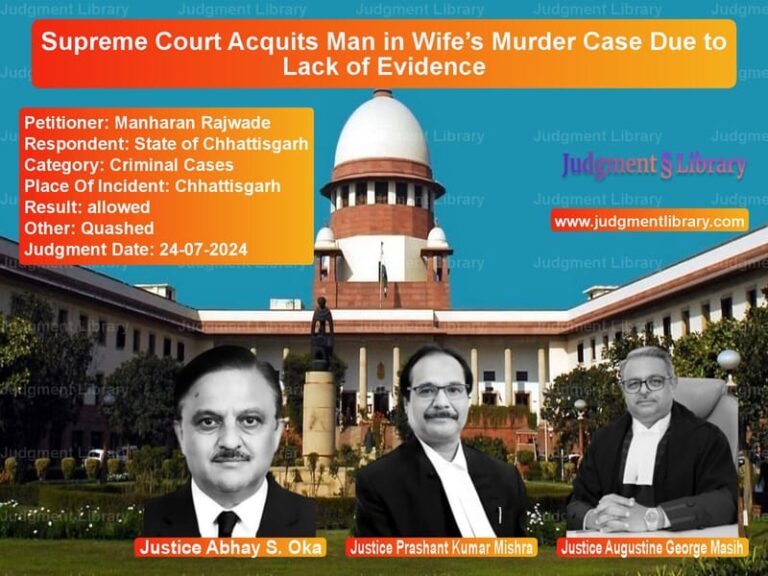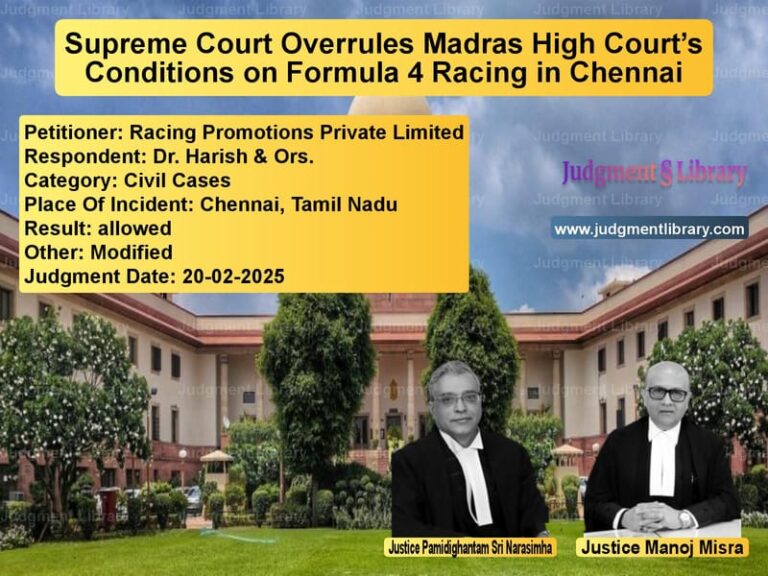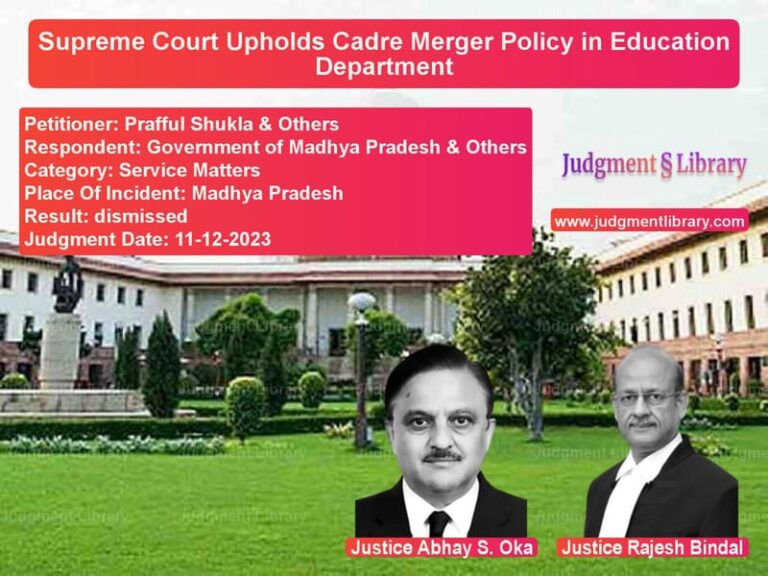Supreme Court Dismisses Pension Claim of UP Roadways Retired Officials
The case of UP Roadways Retired Officials and Officers Association vs. State of U.P. & Anr. is a significant ruling concerning pension entitlements for employees of the erstwhile Uttar Pradesh Roadways who were later absorbed into the Uttar Pradesh State Road Transport Corporation (UPSRTC). The Supreme Court dismissed the pension claims, ruling that these employees were not holding pensionable posts before or after their absorption into the corporation.
Background of the Case
The dispute revolved around whether retired employees of the Uttar Pradesh Roadways, which was a temporary department before being converted into the UPSRTC, were entitled to a pension. The petitioners, comprising retired officials and officers, sought to be granted pension benefits on the basis of government orders (GOs) issued over the years.
Initially, the Uttar Pradesh Roadways was created in 1947 as a temporary department. A government order (GO) issued on September 16, 1960, laid out service conditions, differentiating between permanent and temporary employees. Another GO issued on October 28, 1960, granted pension benefits to only certain categories of employees, while others were placed under the Employees Provident Fund (EPF) scheme.
In 1972, the U.P. State Roadways Transport Corporation was created under the Road Transport Corporation Act, 1950, and all employees of the Roadways were placed on deputation with the corporation. In subsequent years, further government orders addressed the transition of employees to the UPSRTC.
Petitioners’ Arguments
The appellants made the following arguments in favor of their pension claim:
- They were entitled to pension as per the government orders issued in 1960 and 1972.
- The 1977 amendment to Article 350 of the U.P. Civil Service Regulations implied that all employees should be deemed to be holding pensionable posts unless specifically excluded.
- They relied on the Allahabad High Court’s judgments in Mirza Athar Beg, S.M. Fazil, and Shri Narain Pandey, which had ruled in favor of pension entitlement for certain UPSRTC employees.
- The government had never issued a specific order excluding them from pension benefits.
- The delay in filing their writ petition should not bar them from receiving pension since it was a recurring cause of action.
Respondents’ Arguments
The State of Uttar Pradesh and UPSRTC opposed the pension claim, arguing that:
- The employees were already paid all their post-retirement benefits under the Employees Provident Fund (EPF) scheme.
- The Roadways was a temporary department, and its employees were appointed on temporary posts without pension eligibility.
- The petitioners had failed to challenge their pension status for decades after retirement.
- The government orders clearly excluded non-gazetted Roadways employees from pension eligibility.
- The precedents relied upon by the appellants were distinguishable since the employees in those cases held pensionable posts.
Supreme Court’s Observations
The Supreme Court analyzed the historical government orders and statutory provisions and made the following key observations:
“The Roadways was created as a temporary department in 1947, and its employees were appointed on temporary posts. The government order dated 28.10.1960 provided pension only to certain permanent employees, and the rest were entitled only to EPF benefits.”
The Court further ruled:
“The petitioners have failed to establish that they held pensionable posts before their absorption into UPSRTC. The continued reliance on the 1960 government order is misplaced, as it clearly distinguished between pensionable and non-pensionable employees.”
On the issue of precedents relied upon by the petitioners, the Court noted:
“The cases of Mirza Athar Beg, S.M. Fazil, and Shri Narain Pandey involved employees who were working in pensionable posts. The present petitioners, on the other hand, were never appointed to pensionable positions.”
Final Verdict
The Supreme Court dismissed the appeal, ruling:
“The appellants’ claim for pension is not legally sustainable. They have already availed post-retirement benefits under the EPF scheme, and allowing pension benefits now would amount to double benefits, which is impermissible.”
Implications of the Judgment
The ruling has significant implications for government employees and corporations:
- Clarification on pension eligibility: Employees must be holding a pensionable post before retirement to be eligible for pension.
- Limited application of precedents: The Court clarified that previous judgments favoring pension claims do not apply universally.
- Timely legal action required: The ruling underscores that employees must assert their rights in a timely manner, rather than filing claims decades after retirement.
- Prevention of double benefits: Employees who have already received post-retirement benefits under one scheme cannot claim additional benefits under another.
Conclusion
The Supreme Court’s judgment in this case provides a definitive ruling on pension entitlements for former UP Roadways employees absorbed into UPSRTC. By reaffirming the principle that pension eligibility is determined by the nature of the post held at the time of service, the Court has ensured clarity in service jurisprudence and prevented retrospective claims that could burden public finances.
Petitioner Name: UP Roadways Retired Officials and Officers Association.Respondent Name: State of U.P. & Anr..Judgment By: Justice Hrishikesh Roy, Justice Prashant Kumar Mishra.Place Of Incident: Uttar Pradesh.Judgment Date: 26-07-2024.
Don’t miss out on the full details! Download the complete judgment in PDF format below and gain valuable insights instantly!
Download Judgment: up-roadways-retired-vs-state-of-u.p.-&-anr.-supreme-court-of-india-judgment-dated-26-07-2024.pdf
Directly Download Judgment: Directly download this Judgment
See all petitions in Pension and Gratuity
See all petitions in Public Sector Employees
See all petitions in Employment Disputes
See all petitions in Disciplinary Proceedings
See all petitions in Termination Cases
See all petitions in Judgment by Hrishikesh Roy
See all petitions in Judgment by Prashant Kumar Mishra
See all petitions in dismissed
See all petitions in supreme court of India judgments July 2024
See all petitions in 2024 judgments
See all posts in Service Matters Category
See all allowed petitions in Service Matters Category
See all Dismissed petitions in Service Matters Category
See all partially allowed petitions in Service Matters Category






